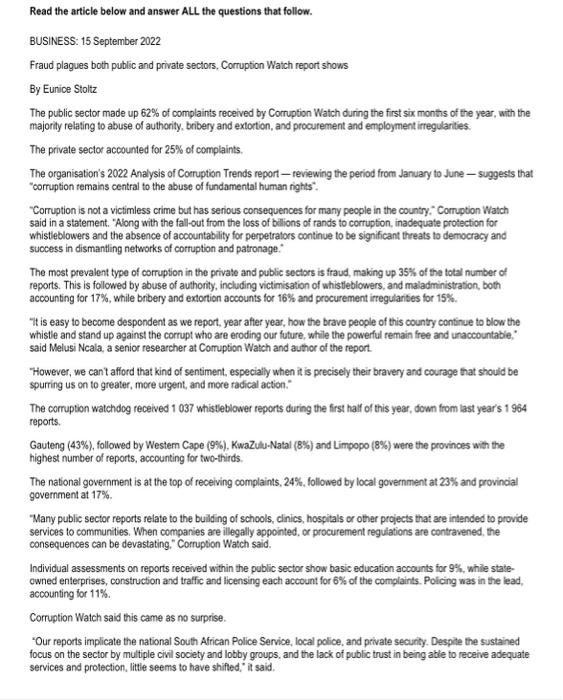Read the article below and answer ALL the questions that follow. BUSINESS: 15 September 2022 Fraud plagues both public and private sectors, Corruption Waich report shows By Eunice Stoltz The public sector made up 62% of complaints received by Comuption Watch during the first six months of the year, with the majority relating to abuse of authority, bribery and extortion, and procurement and employment irregularites. The private sector accounted for 25% of complaints. The organisation's 2022 Analysis of Coruption Trends report - reviewing the period from January to June - suggests that "corruption remains central to the abuse of fundamental human fights". "Corruption is not a victimless crime but has serious consequences for many people in the country, Corruption Watch said in a statement. "Along with the fall-out from the loss of bilions of rands to corruption, inadequate protection for whistleblowers and the absence of accountability for perpetrators continue to be significant threats to democracy and success in dismantling networks of corruption and patronage." The most prevalent type of comuption in the private and public sectors is fraud, making up 35% of the total number of reports. This is followed by abuse of authonty, including victimisation of whistleblowers, and maladministration, both accounting for 17%, while bribery and extortion accounts for 16% and procurement irregularites for 15%. It is easy to become despondent as we report, year after year, how the brave people of this country continue to blow the whistle and stand up against the corrupt who are eroding our future, while the powerful remain free and unaccountable," said Melusi Ncala, a senior researcher at Comuption Watch and author of the report. "However, we cant afford that kind of sentiment, especially when it is precisely their bravery and courage that should be spurring us on to greater, more urgent, and more radical action." The corruption watchdog received 1037 whistebiower reports during the first half of this year, down from last year's 1964 reports. Gauteng (43\%), followed by Westem Cape (9%), KwaZulu-Natal (8%) and Limpopo (8%) were the provinces with the highest number of reports, accounting for two-thirds. The national government is at the top of receiving complaints, 24%, followed by local government at 23% and provincial government at 17%. Many public sector reports relate to the building of schools, cinics, hospitals or other projects that are intended to provide services to communities. When companies are illegally appointed, or procurement regulations are contravened. the consequences can be devastating," Corruption Watch said. Individual assessments on reports received within the public sector show basic education accounts for 9%, while stateowned enterprises, construction and traffic and licensing each account for 6% of the complaints. Policing was in the lead, accounting for 11%. Corruption Watch said this came as no surprise. "Our reports implicate the national South African Police Service, local police, and private securily. Despite the sustained focus on the sector by multiple civil society and lobby groups, and the lack of public trust in being able to receive adequate services and protection, little seems to have shifted, "it said. The article reflects a dire state of corruption within South African business. Considering this, what advice would you give to a company on how to get stakeholders to make more ethical decisions in the day to day running of the company. Your answer should consider questions to analyse when judging the moral soundness of a decision








